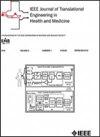使用软件无线电对心肺活动进行非接触式测量
IF 4.4
3区 医学
Q2 ENGINEERING, BIOMEDICAL
IEEE Journal of Translational Engineering in Health and Medicine-Jtehm
Pub Date : 2024-07-29
DOI:10.1109/JTEHM.2024.3434460
引用次数: 0
摘要
生命体征是评估病人健康状况的重要指标。通道状态信息(CSI)能以非接触方式感知心肺活动引起的胸壁位移。由于杂波、直流分量和呼吸谐波的影响,很难检测到可靠的心跳信号。为解决这一问题,本文提出了一种利用软件定义无线电(SDR)同时提取呼吸和心跳信号的稳健而新颖的方法。具体来说,我们对信号进行建模和分析,并提出基于奇异值分解(SVD)的杂波抑制方法来增强生命体征信号。通过圆拟合方法对直流电进行估计和补偿。然后,通过改进的变分模态分解(VMD)得到心跳信号和呼吸信号。实验结果表明,所提出的方法能从滤波信号中准确分离出呼吸信号和心跳信号。布兰德-阿尔特曼分析表明,所提出的系统与医疗传感器具有良好的一致性。此外,建议的系统还能准确测量 0.5 米以内的心率变异性(HRV)。总之,我们的系统可作为传统接触式医疗传感器的首选非接触式替代品,提供以患者为中心的先进医疗解决方案。本文章由计算机程序翻译,如有差异,请以英文原文为准。
Non-Contact Measurement of Cardiopulmonary Activity Using Software Defined Radios
Vital signs are important indicators to evaluate the health status of patients. Channel state information (CSI) can sense the displacement of the chest wall caused by cardiorespiratory activity in a non-contact manner. Due to the influence of clutter, DC components, and respiratory harmonics, it is difficult to detect reliable heartbeat signals. To address this problem, this paper proposes a robust and novel method for simultaneously extracting breath and heartbeat signals using software defined radios (SDR). Specifically, we model and analyze the signal and propose singular value decomposition (SVD)-based clutter suppression method to enhance the vital sign signals. The DC is estimated and compensated by the circle fitting method. Then, the heartbeat signal and respiratory signal are obtained by the modified variational modal decomposition (VMD). The experimental results demonstrate that the proposed method can accurately separate the respiratory signal and the heartbeat signal from the filtered signal. The Bland-Altman analysis shows that the proposed system is in good agreement with the medical sensors. In addition, the proposed system can accurately measure the heart rate variability (HRV) within 0.5m. In summary, our system can be used as a preferred contactless alternative to traditional contact medical sensors, which can provide advanced patient-centered healthcare solutions.
求助全文
通过发布文献求助,成功后即可免费获取论文全文。
去求助
来源期刊

IEEE Journal of Translational Engineering in Health and Medicine-Jtehm
Engineering-Biomedical Engineering
CiteScore
7.40
自引率
2.90%
发文量
65
审稿时长
27 weeks
期刊介绍:
The IEEE Journal of Translational Engineering in Health and Medicine is an open access product that bridges the engineering and clinical worlds, focusing on detailed descriptions of advanced technical solutions to a clinical need along with clinical results and healthcare relevance. The journal provides a platform for state-of-the-art technology directions in the interdisciplinary field of biomedical engineering, embracing engineering, life sciences and medicine. A unique aspect of the journal is its ability to foster a collaboration between physicians and engineers for presenting broad and compelling real world technological and engineering solutions that can be implemented in the interest of improving quality of patient care and treatment outcomes, thereby reducing costs and improving efficiency. The journal provides an active forum for clinical research and relevant state-of the-art technology for members of all the IEEE societies that have an interest in biomedical engineering as well as reaching out directly to physicians and the medical community through the American Medical Association (AMA) and other clinical societies. The scope of the journal includes, but is not limited, to topics on: Medical devices, healthcare delivery systems, global healthcare initiatives, and ICT based services; Technological relevance to healthcare cost reduction; Technology affecting healthcare management, decision-making, and policy; Advanced technical work that is applied to solving specific clinical needs.
 求助内容:
求助内容: 应助结果提醒方式:
应助结果提醒方式:


